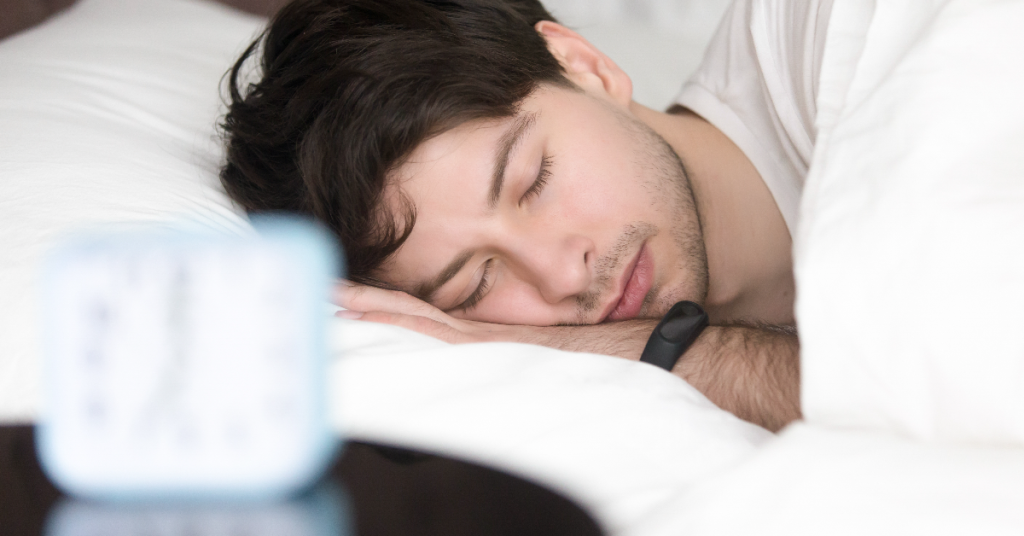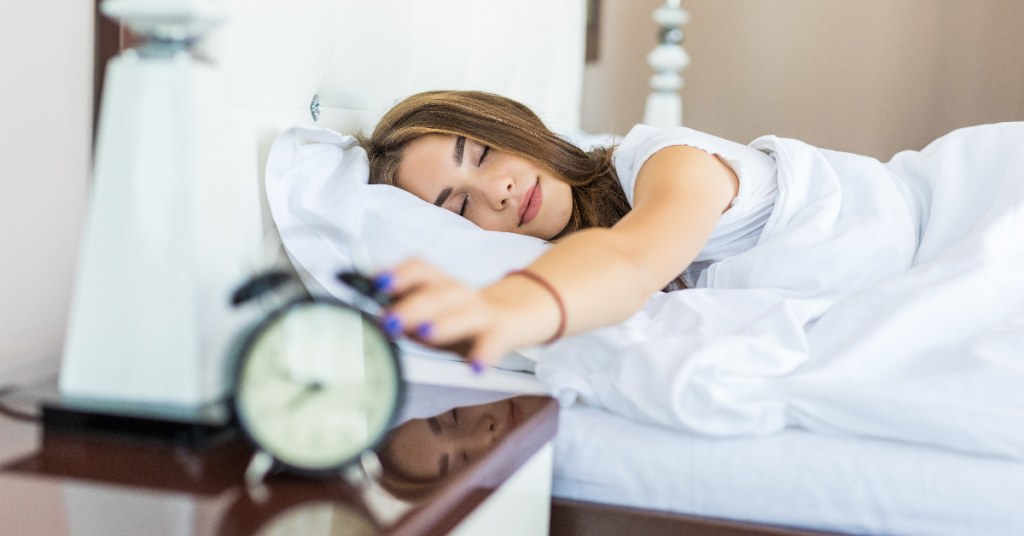Sleep is essential for overall health and well-being. However, in the UK, many individuals struggle with sleep-related issues that negatively affect their mood, focus, and physical health. Poor sleep can lead to feelings of fatigue, irritability, and even long-term health complications. The good news is that there are many effective ways to improve sleep quality fast, and with the right strategies, you can start sleeping better almost immediately. Many people search for quick fixes, especially when they need to improve their sleep quality quickly. Whether it’s due to work stress, busy lifestyles, or an irregular sleep schedule, we all experience nights when sleep doesn’t come as easily as we would like. However, improving sleep quality doesn’t have to be complicated or take a long time. By making simple changes to your habits and environment, you can improve sleep quality fast and enjoy more restful and refreshing sleep.
Improve Sleep Quality Fast :7 Proven Tips for Better Rest
If you’re struggling with sleep, you’re not alone. Many people in the UK find it tough to get enough quality rest. Whether it’s due to stress, an irregular schedule, or environmental distractions, poor sleep can affect your mood, energy, and overall health. The good news is, there are simple changes you can make to improve sleep quality fast. Below are 7 proven tips that can help you sleep better and feel more refreshed.
1. Create a Regular Sleep Routine
A key to better sleep is consistency. Having a regular sleep routine is called “sleep hygiene.” This means going to bed and waking up at the same time every day, even on weekends. By sticking to a schedule, your body learns when to rest and when to be awake. This helps you fall asleep more easily and wake up feeling more refreshed.
Here’s how to build a good sleep routine:
- Set a bedtime and wake-up time: Choose a time that works for you and stick to it every day.
- Wind down before bed: About 30 minutes before bed, start relaxing. Avoid bright screens, such as phones or computers, as they can make you stay awake longer.
- Limit naps: If you nap during the day, make sure they are short. Long naps can make it harder to sleep at night.
A regular sleep routine helps signal your body that it’s time to sleep, making it easier to fall asleep and wake up at the right time.

2. Make Your Bedroom Sleep-Friendly
The environment where you sleep plays a huge role in how well you sleep. A bedroom that is too hot, too noisy, or too bright can make it hard to fall asleep. To improve your sleep environment, follow these simple tips:
Keep it cool
Most people sleep better in a cool room. Try to keep your bedroom at a temperature between 16-18°C (60-65°F). This will help your body relax and prepare for sleep.
Keep it dark
Darkness helps your body produce melatonin, a hormone that makes you feel sleepy. You can use blackout curtains or blinds to block out light. If light still seeps in, consider wearing an eye mask.
Reduce noise
Loud sounds can disturb your sleep. To reduce noise, try earplugs or use white noise machines. If your environment is very noisy, you might want to move your bed away from windows or doors.
Keep your bed comfortable
Your mattress and pillows should be comfortable. A mattress that’s too hard or too soft can cause discomfort, leading to poor sleep. If you’re not sure, consider replacing your mattress or adding a pillow for extra support.
Declutter
A tidy, clutter-free space helps your mind relax. Keep only essentials in your bedroom to create a peaceful environment.
By improving your sleep environment, you make it easier for your body and mind to fall asleep and stay asleep.
3. Watch What You Eat and Drink
Your diet can have a big impact on your sleep. What you eat during the day and before bed can either help or harm your sleep quality. Follow these tips to improve your sleep through diet:
Avoid caffeine
Caffeine is a stimulant that can keep you awake. It’s found in coffee, tea, chocolate, and some soft drinks. Try to avoid caffeine in the afternoon and evening, as it can interfere with your sleep.
Limit alcohol
While alcohol may make you feel sleepy, it can disrupt your sleep later in the night. It can cause you to wake up more often and reduce the quality of your sleep. Limit alcohol, especially in the hours before bedtime.
Eat light before bed
Avoid heavy meals before going to bed. Large, rich meals can cause discomfort and indigestion, making it hard to sleep. If you’re hungry before bed, choose a light snack like a banana or a small bowl of oatmeal.
Stay hydrated
Being well-hydrated is important for sleep, but drinking too much water before bed can lead to frequent trips to the bathroom during the night. Aim to drink most of your fluids earlier in the day.
By paying attention to what you eat and drink, you can improve your chances of getting a restful night’s sleep.
4. Relax Your Mind with Meditation
If you have trouble winding down at night, meditation can be a helpful tool. Meditation helps calm your mind and relax your body, making it easier to fall asleep. Here are some simple meditation techniques that can improve sleep:
Guided meditation
Listen to a guided meditation audio before bed. There are many free options online, and some apps focus specifically on helping people sleep. These recordings will guide you through calming breathing exercises and relaxation techniques.
Deep breathing
Deep breathing exercises help lower your heart rate and calm your mind. To try this, sit in a comfortable position, breathe in slowly for a count of four, hold your breath for four, and then exhale for four. Repeat for several minutes.
Progressive muscle relaxation
Progressive muscle relaxation involves tensing and relaxing different muscle groups in your body. Start with your toes and work your way up to your head, tensing each muscle for a few seconds and then relaxing it. This helps reduce tension and prepares your body for rest.
Meditation helps clear your mind of distractions and promotes a sense of calm. By practicing meditation regularly, you can improve both the quality and the speed of your sleep.

5. Avoid Electronics Before Bed
Electronics like smartphones, tablets, and computers can interfere with your sleep. The blue light emitted by these devices suppresses melatonin, the hormone that helps you fall asleep. Here’s how to avoid this:
Avoid screens at least 30 minutes before bed
Try to stop using electronics at least 30 minutes before going to bed. Instead, you can read a book, listen to relaxing music, or do a calming activity to unwind.
Use blue light filters
If you must use your phone or computer before bed, consider using a blue light filter. Many smartphones and computers now have a built-in feature that reduces blue light. This can help minimize the negative effects on your sleep.
Turn off notifications
The sound of notifications can disrupt your relaxation and sleep. Set your phone to “Do Not Disturb” or put it on silent when you’re winding down for bed.
By avoiding electronics before bed, you allow your brain to relax and prepare for a good night’s sleep.
6. Exercise Regularly for Better Sleep
Exercise is one of the most effective ways to improve sleep quality. Regular physical activity helps your body relax and sleep more deeply. It also reduces anxiety and stress, which are common causes of sleep problems. However, it’s important to time your exercise correctly.
How exercise helps with sleep
Exercise boosts your mood by releasing endorphins, the “feel-good” hormones. It also helps regulate your body’s natural sleep-wake cycle, known as the circadian rhythm. By doing regular exercise, you help your body understand when it’s time to be awake and when it’s time to rest.
Best time to exercise
For most people, exercising in the morning or afternoon is best. Vigorous exercise close to bedtime can actually make it harder to fall asleep. This is because your body is too energized from the workout. If you exercise in the evening, aim to finish your workout at least 90 minutes before bed.
Types of exercise to try
You don’t need to run marathons to benefit from exercise. Even moderate activities, like walking, yoga, or swimming, can help improve sleep quality. Yoga, in particular, is beneficial because it incorporates breathing exercises and stretches that relax your muscles and calm your mind.
How much exercise is needed?
For better sleep, try to aim for at least 30 minutes of moderate exercise most days of the week. However, if you’re new to exercise, start slowly and gradually increase the intensity and duration. Even short walks can make a big difference.
By incorporating regular exercise into your daily routine, you can help your body unwind and enjoy better, more restful sleep.
7. Manage Stress and Anxiety
Stress and anxiety are two of the biggest obstacles to good sleep. Worrying about work, relationships, or other concerns can keep your mind active long into the night. Learning how to manage these feelings can help you sleep better.
Mindfulness for sleep
Mindfulness is a mental practice that encourages you to focus on the present moment without judgment. It helps you let go of anxious thoughts and worries, making it easier to relax before bed. There are many mindfulness techniques that can improve sleep:
- Mindful breathing: Focus on your breath as you inhale and exhale. Try to clear your mind of any distractions as you breathe slowly and deeply.
- Gratitude practice: Before bed, take a moment to think of three things you’re grateful for. This practice helps shift your focus away from stress and brings positive thoughts to your mind.
- Body scan: A body scan involves mentally scanning your body from head to toe, paying attention to areas of tension. As you notice tension, consciously relax those areas.
Talk to someone
Sometimes, simply talking to a friend, family member, or professional can help you feel less anxious. Having a conversation about your worries or challenges can help you gain perspective and release some of the mental tension.
By managing your stress and anxiety, you can improve your chances of falling asleep quickly and sleeping deeply throughout the night.
Start Improving Your Sleep Today
Improving your sleep quality doesn’t have to be complicated. By following these seven proven tips, you can quickly start seeing results. Creating a regular sleep routine, making your bedroom sleep-friendly, watching what you eat and drink, practicing relaxation techniques, avoiding electronics before bed, exercising regularly, and managing stress and anxiety can all help you get better rest.
Remember, sleep is a vital part of overall health. It affects your mood, energy levels, and ability to focus during the day. If you’re struggling with sleep, try implementing one or two of these tips at a time. Over time, you’ll find what works best for you, and you’ll be on your way to getting the restful sleep you deserve.
FAQs: Improving Sleep Quality
1. How long should I sleep for to feel rested?
For most adults, 7-9 hours of sleep is ideal for feeling rested. However, some people may need slightly more or less sleep. Listen to your body, and aim for the amount of sleep that makes you feel refreshed and alert during the day.
2. Can I improve my sleep without medication?
Yes! Many people improve their sleep through lifestyle changes, like creating a better sleep routine, improving their environment, and managing stress. Medication should only be considered when lifestyle changes are not effective and under the guidance of a healthcare professional.
3. What can I do if I can’t sleep even after trying these tips?
If you’ve tried these tips and still struggle to sleep, it may be time to speak to a healthcare professional. They can help identify any underlying conditions, such as insomnia or sleep apnea, and provide further advice or treatment.
4. Is it okay to exercise in the evening?
While exercising in the morning or afternoon is generally recommended, some people can exercise in the evening without affecting their sleep. If you prefer evening workouts, avoid intense activity too close to bedtime, and try finishing your exercise at least 90 minutes before you go to sleep.
5. How can meditation help me sleep better?
Meditation calms your mind and relaxes your body, making it easier to fall asleep. Techniques like deep breathing, progressive muscle relaxation, and guided sleep meditations can reduce stress and anxiety, helping you unwind before bed.
6. How can I stop waking up in the middle of the night?
If you wake up in the middle of the night, avoid looking at your phone or clock. Instead, try deep breathing or visualization exercises to help you fall back asleep. If this becomes a regular problem, consider evaluating your sleep environment or speaking to a healthcare professional.
7. Should I avoid naps during the day?
Short naps (10-20 minutes) can be helpful for refreshing your energy, but long naps or napping late in the day can interfere with your night-time sleep. If you feel the need to nap, try to do so earlier in the day.
By following the strategies outlined above, you’ll be able to improve your sleep quality quickly and effectively. Sleep is crucial for both mental and physical health, so make it a priority, and enjoy the benefits of better rest!

